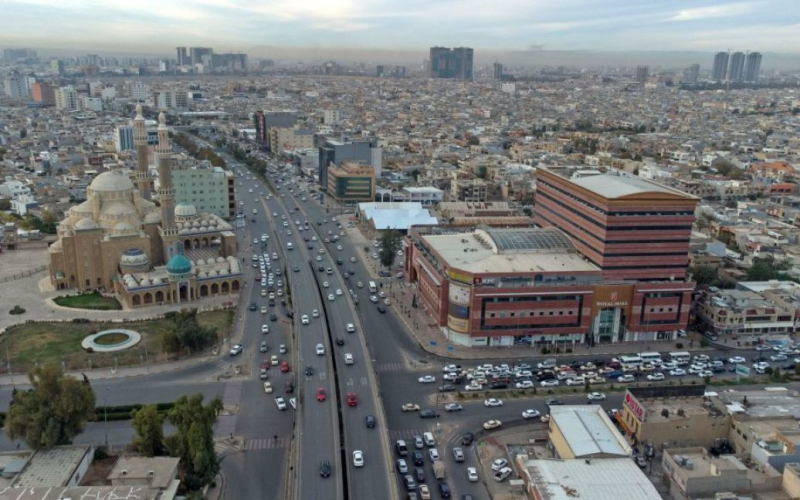The situation in the Middle East is heating up.
Iran's Islamic Revolutionary Guard Corps (IRGC) attacked “anti-Iranian” targets with ballistic missiles near the city of Erbil, the capital of Iraqi Kurdistan, in Syria, and also fired at Pakistan.
TSN.ua offers you an adaptation of the Time material with all the details of the Iranian attacks.
Attack of US targets in Iraqi Erbil
Islamic Revolutionary Guard Corps, a branch of Iran's armed forces, launched ballistic missiles on Monday, January 15, at what it called a “spy headquarters” in Erbil, northern Iraq. Ten rockets fell near the US Consulate, Iraqi sources said.
“In response to the recent evil actions of the Zionist regime regarding the martyrdom of IRGC and resistance commanders, the Islamic Revolutionary Guard Corps, with its nobility and intelligence, fired ballistic missiles at one of the main headquarters of the Israeli spy agency Mossad,” the group said in a statement. which was reported by Iran's state news agency.
“This Mossad headquarters,” the statement said, citing Israeli intelligence, “operated for espionage operations and was the center for planning terrorist attacks in the region, especially against our beloved country.” .
Iraqi officials deny the building has Mossad ties.
No American assets were damaged, U.S. officials said. An Iraqi security source told ABC News that no members of the coalition or U.S. forces were killed. However, according to the Kurdistan Regional Security Council, at least four civilians were killed and six wounded in the attack.
Iraqi news agency Rudaw reported that 17 people were wounded, and the youngest victim was an 11-month-old child who was killed days before her first birthday.
Iraqi politician Mashan al-Jabouri wrote in a message on platform X (formerly Twitter) that the famous Kurdish businessman Peshrau Dizaei was among those who died from one of those that fell on the “palace” of Dizaei rockets. It is also reported that as a result of the attack, Dizai's daughter Zhina, the family's foreign nanny, whose name has not been revealed, and Dizai's acquaintance Karam Mikhail were killed.
ABC News reports that coalition forces also shot down three drones near Erbil airport, the latest in an increase in drone attacks in the area where U.S. and other international forces are stationed. Air traffic at the airport has been suspended, Rudaw confirmed.
In a statement condemning the attack in Erbil, the US State Department said the strikes were “reckless” and “undermine the stability of Iraq.”
Read the leading news of the day:
Iraqi Kurdish Governor Omed Khoshnaw told reporters that Monday's strikes were a “terrorist attack” and an “inhumane act.” “Erbil will not be afraid or shaken,” he said.
On Tuesday, January 16, Iraq recalled its ambassador from Tehran and summoned Iran's charge d'affaires in Baghdad over the Iranian strikes, and the Iraqi Foreign Ministry announced it would file a complaint against Iran with the United Nations Security Council.
Ballistic missiles in Syria
The IRGC also carried out a separate missile attack that hit targets in Syria, the group said in a statement Monday. The attack targeted those allegedly involved in the Kerman bombing earlier this month that killed at least 94 people, as well as an attack on a police station in the city of Rask.
Syrian Civil Defense, a volunteer organization known as the White Helmets, said the strike targeted a defunct medical center, leaving two civilians with minor injuries.
Missile and drone attacks on Pakistan
On Tuesday, Iranian state media reported that the IRGC also struck two militant bases in Pakistan, although those reports were later deleted. Pakistani officials told The Associated Press that a mosque was damaged in the attacks, and Pakistan's Foreign Ministry said in a statement that the attack killed two children and injured three others.
The statement also noted that Iran's charge d'affaires had been summoned to the ministry in connection with a “blatant violation of Pakistan's sovereignty” and that “responsibility for the consequences will be held by Iran.”
“The dangerous precedent set by Iran is destabilizing and has reciprocal consequences,” a senior Pakistani security official said in an interview with The Associated Press on Wednesday, January 17. < /p>
This week's strikes come amid escalating tensions in the Middle East following the outbreak of war between Israel and Hamas, which has led to conflicts between allies of each side – in particular between the Israeli-backed US and Iran, which supports Hamas.
Iran's allies in the region, particularly the Houthi rebels in Yemen, have carried out dozens of attacks on ships in the strategic Red Sea bound for Israel in recent months. Last week, the US and UK launched a major retaliation operation against Yemen's Houthis, which some fear could escalate into a wider regional war.
Read also:
Related topics:
More news

